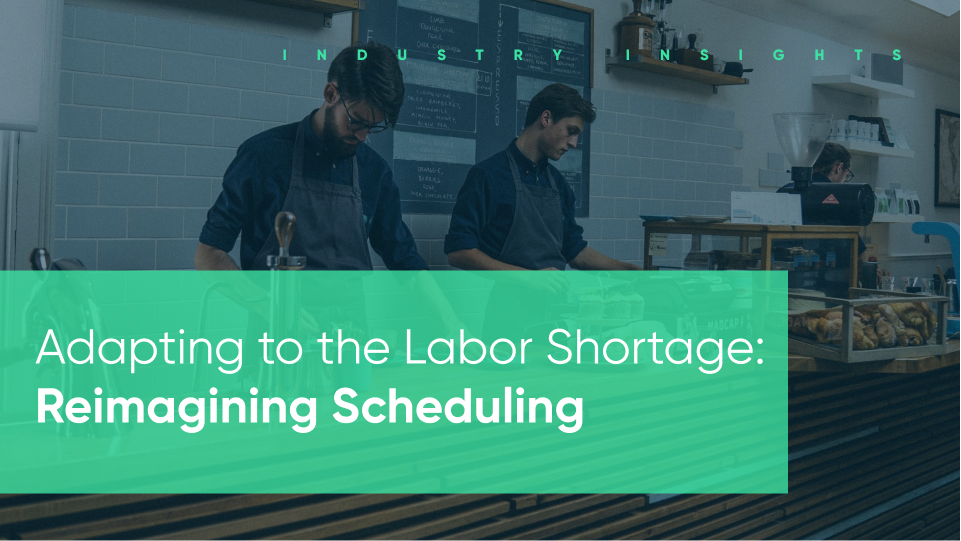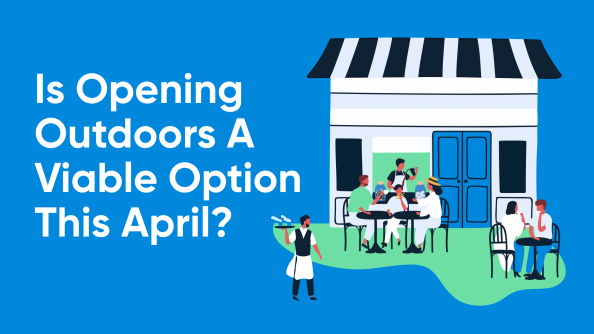Adapting to the Labor Shortage: Reimagining Scheduling

- By Harri Insider Team | August 16, 2021
Our Founder and CEO, Luke Fryer, recently spoke about this in a Hospitality State of Labor webinar, analyzing the full spectrum of today’s hospitality laborscape. We dive deeper into this subject to discuss the importance of flexible scheduling to the future of hospitality operations, and how brands can utilize the right tech stack to reimagine outdated scheduling processes.
Flexible scheduling: how did we get here?
On-demand scheduling is operationally unsustainable. But even more than that, today’s hospitality employees won’t stand for it.
COVID-19 gave everyone, frontline hospitality employees included, the opportunity to take a step back and evaluate their job, resulting in “the great reshuffle.” Short and long-term sustainability, both financially and in terms of work-life balance, became a priority as we navigated uncertainty during the pandemic.
Hospitality as a whole generally did not offer either of these to its employees. Just in time scheduling modules, implemented to adapt to customer demand, mean unstable, unpredictable hours.
To further add to that, our 2021 Hospitality Employee Experience Report found that frontline hospitality workers ranked “having a reliable, predictable schedule” as the most important factor of the employee experience.
So what does that mean for service-based workers? A non-existent work-life balance. If you scheduled a doctor’s appointment, arranged childcare, or even made plans with friends based on your schedule, last-minute changes throw all planning out the window. And because scheduling is directly tied to employee compensation, lack of stability means employees lack transparency into their expected pay each week.
This is further evidenced by Fair Workweek scheduling laws, which aim to provide predictable schedules for hourly employees while also compensating them for accommodating last-minute changes.
When COVID-19 gave workers time to consider this, most of them left the hospitality industry. It’s clear that now more than ever before that hospitality’s labor module needs to change.
The proper tech makes all the difference
Overhauling HR and people operation processes might seem like the easy answer, but smarter scheduling has proven to be the most effective way to keep up retention. The labor shortage isn’t going away anytime soon, and we’ll continue to feel rippling impacts for years to come — such as the shift in power in the recruitment process.
The ability to not only offer flexible scheduling, but consistently deliver employees optimal shifts during times they want to work and with the people they love to work with is a huge competitive advantage for talent seekers.
And with the right solution, providing such equitable scheduling is possible without disrupting day-to-day operations.
But operators cannot be expected to maintain efficient operations while complying with local labor laws and navigating the worst labor crisis our industry has seen in a long, long time. Predictive scheduling is the centerpiece of achieving labor efficiency while catering to both the needs of your employees and your customers.
Hospitality is a unique industry with its complex compliance requirements and high demand for labor. Brands need a hospitality-specific scheduling solution to maximize the workforce while maintaining labor efficiency.
Most scheduling platforms weren’t created with the nuances of hospitality scheduling in mind, and as such, don’t come close to breaching the wide breadth of requirements needed to create effective schedules — and quickly.
Hospitality schedules need to consider:
- Employee availability and scheduling preferences
- Employee skillsets
- Federal and local compliance requirements
- Break requirements
- Sales based on day, time, seasonality, and weather
We built Harri with this sentiment in mind.
By factoring in key metrics related to the guest experience, such as the bullet points listed above, Harri is able to suggest smarter schedules that set brands up for labor efficiency.
But sales data alone isn’t enough to reimagine your scheduling process for the needs of today’s workforce.
Employee data must be layered in to ensure you’re getting the most out of your team while ensuring scheduling satisfaction. When your people are happy, they’ll perform better and stay with your business longer.
But managers can’t be expected to keep track of and deliver employee-centric schedules when managing dozens of team members in a hectic restaurant environment.
Harri’s position-based scheduling considers employee availability, skillset, schedule preferences, and existing hours scheduled (for compliance purposes) to cover the full spectrum of people-first scheduling. And of course, compliance is baked in. From localized Fair Workweek predictive scheduling laws to overtime and break management, our intelligent scheduling platform considers all wage and labor requirements to empower managers to make informed scheduling decisions.
Any scheduling reevaluation is incomplete without granular labor analytics to ensure your people processes are performing as expected, or better yet, exceeding expectations.
Updating scheduling processes across one or many locations is a complex process, and there will be gaps the first few times around. Harri’s real-time labor analytics ensure managers always have a finger on the pulse to know which scheduling strategies are working, and which need fine-tuning.
Understand how employee shift times and who is on shift impacts customer check totals. See if your extra compliance spend was worth the added labor or if your team could have managed a shift with one less person — without feeling overwhelmed.
And if you throw time and attendance analytics into the mix, managers can overlay employee sentiment checks to further understand if operational processes are meeting team needs. What they say to your face and what they punch into the timeclock may differ, and scheduling dissatisfaction is an early sign of preventable team turnover.





















